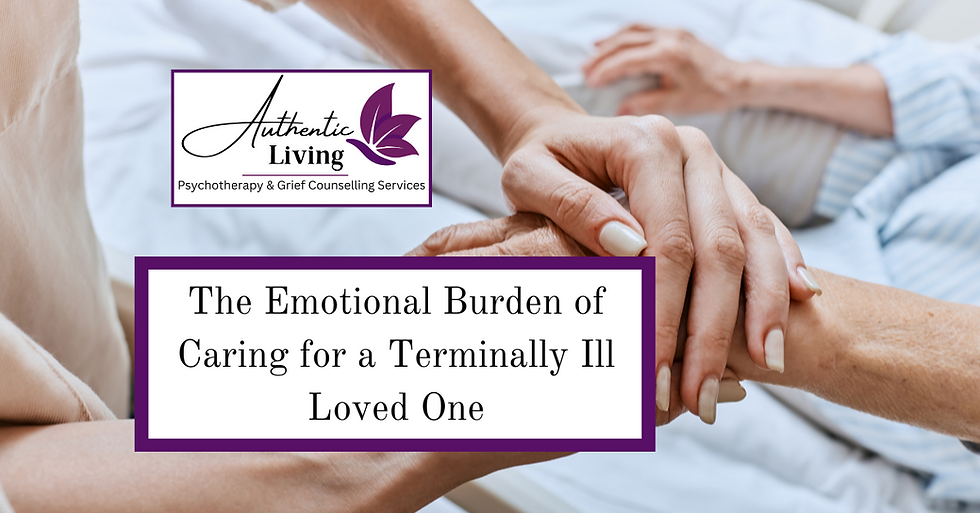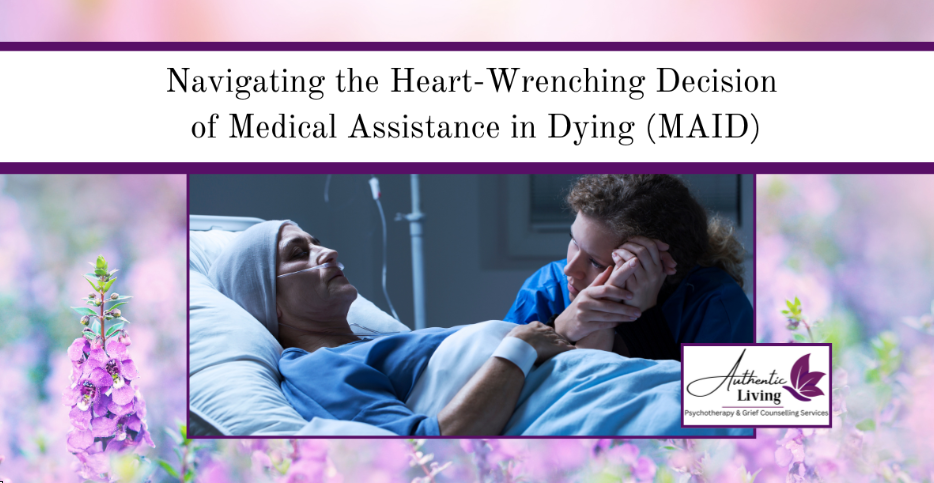The controversy around MAID: Compassion, Choice, and Concern
- Sep 23, 2025
- 5 min read

Medical assistance in dying, often called MAID, sits at the meeting place of deep compassion and sharp disagreement. For some people MAID is a relief and an answer to unbearable suffering. For others it raises real fears about whether the vulnerable are being protected. This blog explores the main lines of the debate of the MAID controversy with empathy for everyone who is affected, and ends with how counselling can provide support during an agonizing decision.
History of MAID in Canada
The legal path to MAID in Canada began with the Supreme Court of Canada decision in Carter v. Canada. After that decision, Parliament created a federal framework that has evolved since 2016 to define who may request medical assistance to end life and under what safeguards. Government of Canada
In 2021 Parliament passed Bill C-7, which made important changes. The law removed the requirement that a person’s natural death be reasonably foreseeable and created a two track approach to safeguards based on whether death is reasonably foreseeable or not. These changes were intended to respond to court decisions and to broaden access in ways legislators believed balanced choice and protection. Government of Canada
One part of the law that has drawn intense attention concerns people whose only underlying medical condition is a mental illness. The federal government has set a later date for that group to become eligible, reflecting the complexity of making assessments and putting safeguards in place. As of Health Canada guidance, people whose only medical condition is a mental illness are not eligible for MAID until March 17, 2027. Government of Canada
Why Many People Support MAID
People who support MAID often speak from personal experience. They describe unbearable symptoms, a sense that suffering cannot be relieved by currently available treatments, and a desire for control over a dying process that is dignified and aligned with their values. For people who are chronically ill or in advanced stages of disease, MAID can feel like a compassionate option when other routes have been exhausted. Supporters also point to careful legal safeguards and assessments designed to protect against impulsive choices and coercion.
Why Others Worry
Those who raise concerns do not do so from callousness. They are often motivated by a desire to protect people who are disabled, poor, isolated, elderly, or struggling with mental illness. Disability rights groups and other advocates have warned that expanding MAID beyond people who are near the natural end of life risks normalizing death as one solution to problems that are social or remediable with better supports. Some groups have brought legal challenges to parts of the law on those grounds, arguing that the balance between autonomy and protection needs to be revisited. Reuters
Researchers and clinicians have also reported real moral stress in practice. Health care workers sometimes worry that systemic problems such as lack of access to home care, pain control, housing, or mental health services can push people toward MAID when those unmet needs might have been addressed otherwise. These are not abstract worries. They are grounded in concrete patient stories and in research about how families experience MAID. Studies show that family members can feel guilt, judgment, secrecy, and complex grief when a loved one chooses MAID. That grief can be complicated by family disagreement about the decision or by social stigma. PMC
The Middle Ground of the MAID Controversy
For many people the truth is that this is not a simple yes or no question. There are cases where MAID feels, to the person choosing it, like the most humane option. There are other cases where the broader context points to missed supports and systemic failures. And there are many cases that sit somewhere between those poles, where good faith disagreements are driven by different life experiences, fears, and values.
Public debate about MAID often turns on how we define a good safeguard and how we make sure choices are informed and free from pressure. It also asks what society owes people who are vulnerable so that choosing death is not the result of abandonment.
How counselling can help, whether you are thinking about MAID or you are a family member
Because MAID is both a medical and deeply personal decision, counselling can be an important space for clarity, safety, and emotional care. Here are ways counselling can help for both the person considering MAID and for family members.
For the person considering MAID
Explore values, fears, and hopes in a calm, nonjudgmental space.
Make sure the decision is informed by accurate information about prognosis, treatments, and alternatives.
Review symptom management, palliative care options, and mental health supports that might improve quality of life.
Clarify whether social or practical needs are driving the request, and connect people to community resources when possible.
Support decision making that aligns with the person’s values while checking for coercion or pressure.
Work on legacy tasks, meaning making, and practical planning to reduce future family conflict.
For family and loved ones
Offer a safe place to express anger, fear, sadness, guilt, and confusion without shame.
Help families communicate about wishes, boundaries, and practical matters in ways that protect relationships.
Validate the very real grief that can begin before death and continue after, including complicated grief reactions when there was disagreement.
Provide guidance on how to support someone who is considering MAID while also caring for one’s own emotional limits.
Connect family members to peer supports and bereavement resources.
Counselling is not about steering someone toward or away from MAID. It is about creating a clear, compassionate space where painful choices can be held openly, and where every effort is made to ensure choices are voluntary and informed.

Jeanette Leroux offers compassionate MAID counselling for people who are considering medical assistance in dying and for family members and loved ones who are affected by that choice. Her work focuses on meeting people where they are with warmth and clarity. For the person considering MAID Jeanette can help you explore your values, review options for symptom relief and palliative care, and make plans that protect your dignity and safety. For families she offers a respectful space to name difficult feelings, learn to communicate about wishes and boundaries, and begin the grieving and meaning making that often comes with these decisions.
If you are curious about counselling with Jeanette, you can reach out to discuss what support would look like in your unique situation. There is no single right answer for everyone, but there is support available so that you do not have to make these decisions alone.
Book a free 15 minute discovery call today by clicking HERE.










Comments